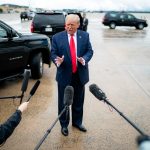In a poignant reminder of the human cost of global conflicts, President Trump recently met with the family of Idon Alexander, an American citizen held hostage in Gaza. This visit, which coincided with the anniversary of a significant event on October 7th, was marked by deep emotion and showed Trump at his empathetic best, connecting with a family enduring unimaginable hardship. It’s crucial to reflect on how such personal stories intersect with broader political themes, particularly when it comes to American foreign policy and the state of our leadership.
During the visit, Trump’s compassion stood in stark contrast to the current administration’s general approach to foreign issues. His ability to connect on a human level sheds light on a critical point: the policies of a leader can directly affect the lives of individuals far beyond our borders. In this instance, the conversation about Idon’s situation represents not just a personal tragedy but a reflection on the effectiveness of current U.S. policies abroad. Is America maintaining its strength and global presence, or are we retreating into a more isolationist stance? According to Trump, the answer lies in a philosophy of “peace through strength,” an idea that resonates with many who see it as a pathway to a more secure nation.
One cannot overlook the context of this meeting either. The political landscape is charged, as evidenced by the ongoing attacks from figures like Kamala Harris, who seems more focused on scoring political points than addressing real issues. Recent remarks from Harris concerning Hurricane Milton, where she aimed barbs at Florida Governor Ron DeSantis, highlight a puzzling tendency among some Democrats to prioritize party politics over genuine crisis management. What we need from our leaders, especially in times of difficulty, is a unified front and strategic thinking, rather than a lurch toward opportunism.
Moreover, there’s the undeniable influence of the media in shaping public perception and, by extension, electoral outcomes. As Trump pointed out in his interview, there’s a concerted effort by media outlets to manipulate the information environment. This tactic has been recognized for influencing voter mobilization. The electorate deserves transparency, and it’s the responsibility of the media to report the facts rather than manipulate narratives for political gains. This calls for an awakening among voters, compelling them to demand honesty from their information sources.
In conclusion, President Trump’s meeting with the Alexander family serves as a reminder of the real stakes involved in international relations. A personal story intertwined with national policy highlights the importance of effective leadership that prioritizes both the welfare of its citizens and a strong stance in global issues. As we observe political maneuvers and media narratives leading up to the next election, it’s essential to remember that voters have the power to choose leaders who reflect their values—leaders who understand that true strength lies not just in rhetoric but in actions that resonate with the very people they represent. The road ahead may be long, but a discerning electorate can navigate it wisely, ensuring that compassion, clarity, and strength guide our nation’s future.




